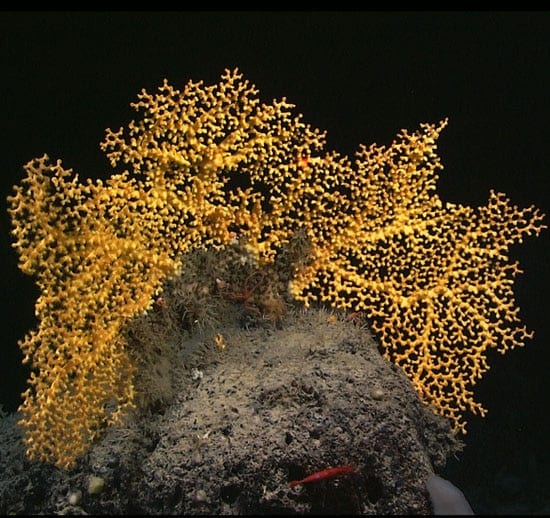Cold Water Corals Conference to be Held in Woods Hole
October 22, 2008
On October 24, 2008, scientists from North America and Europe will meet at the Woods Hole Oceanographic Institution (WHOI) to develop the first coherent plan for studying and conserving cold-water corals in the Atlantic Ocean. The plan will lay the foundations for an international research program beginning 2010.
As part of the Trans-Atlantic Coral Ecosystem Study project (TRACES), these world experts will meet to discuss recent findings and outline future research needs that require international scientific cooperation across the Atlantic Ocean. Dr Murray Roberts, a Research Fellow from the Scottish Association for Marine Science is leading the TRACES project. “Some of the best developed and most studied cold-water coral habitats are in the North Atlantic,” he said, “but they have never been studied and compared across the ocean basin.” Dr. Roberts is supported by a Marie Curie grant from the European Commission.
TRACES is needed now for many reasons, according to Dr. Roberts. Research during the past decade has shown that deep coral ecosystems host extremely high biological diversity that are increasingly at risk due to human activities such as deep-sea fish trawling, energy exploration and production. Once lost, recovery of these ecosystems can take decades to centuries as these corals are among the longest-living species on Earth.
Tim Shank, Associate Scientist in the WHOI Biology Department, is unravelling how the conservation of these vulnerable deep-water habitats requires an understanding of how they are genetically connected throughout the Atlantic. “Understanding how these ecosystems are interconnected, whether through the migratory routes along ocean depths that ultimately support international fisheries or by shifts in ocean circulation brought about by climate change, is critical for conservation and management of these living resources,” Shank said.
Because these corals can live for a thousand years or more, they are useful to scientists studying past climate conditions on Earth, as well as for those seeking to understand how the planet will respond to climate change. The corals contain a unique archive of ocean climate history in their calcium carbonate skeletons. “We are able to use the skeletons of cold-water corals to provide a historic record of how the temperature and chemistry of the deep ocean has changed in the past,” said Laura Robinson, Assistant Scientist in the WHOI Biology Department. “This type of record is tremendously important in building models to estimate the impact of future climate change.”
In an era of concern over climate change, cold-water corals may be among the first ocean species to be affected by increases in deep-water temperature and chemistry. They use calcium carbonate to create their stony skeletons. The ocean is the primary sink on earth for increasing carbon dioxide in the atmosphere. More carbon dioxide lowers the pH of the ocean making it more acidic and more difficult to precipitate calcium carbonate skeletons. This threat is doubled for deep corals that rely on plankton for food, many of which also have calcium carbonate shells.
To accomplish the TRACES science mission, state of the art deep-submergence technologies and future advances will be needed. Autonomous underwater robots (AUVs), Remotely-operated vehicles (ROVs) and Hybrid ROVs outfitted with new sensor technologies will be instrumental in the exploration and research planned by TRACES. The international group meeting at Woods Hole will be able to see exciting new technological developments including innovative Hybrid ROVs capable of working to very deepest portions of the ocean.
The TRACES meeting at Woods Hole is sponsored by the British Consulate in Boston with further support from the European Commission, UK Natural Environment Research Council, Scottish Association for Marine Science, Royal Society of Edinburgh, Canadian Department of Fisheries and Oceans, NOAA National Undersea Research Center, Center for Marine Science University of North Carolina Wilmington, US Geological Survey, Environmental Defense, Oceana, Marine Conservation Biology Institute and the US South Atlantic Fishery Management Council.
For more information
On the TRACES project: www.lophelia.org/traces
On cold-water corals: www.lophelia.org
On the Scottish Association for Marine Science: www.sams.ac.uk
On the Woods Hole Oceanographic Institution: www.whoi.edu
Contact details
British Consulate-General Boston, Dr Stefan Winkler: 617-245-4549 (stefan.winkler@fco.gov.uk)
Marine Technology, Dr Andy Bowen: 508 289 2643 (abowen@whoi.edu)
Cold-water corals, Dr J Murray Roberts: 910-799-7926 or 910-616-8748 (robertsjm@uncw.edu)
Climate archives, Dr Laura Robinson: 508 289 3265 (lrobinson@whoi.edu)
Genetic connectivity, Dr Tim Shank: 508-654-0447 (tshank@whoi.edu)
Press Office contact details
Scottish Association for Marine Science: Dr Anuschka Miller, +44-1631-559300 (anuschka.miller@sams.ac.uk)
Woods Hole Oceanographic Institution: Stephanie Murphy, +1 508 289 2271 (samurphy@whoi.edu)
Pictures are available

